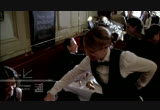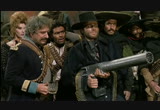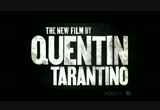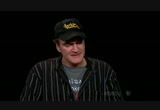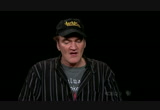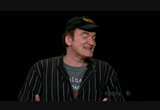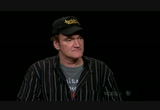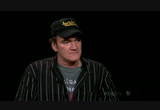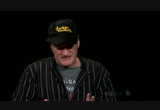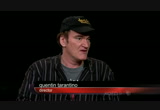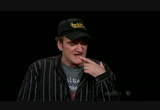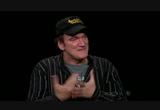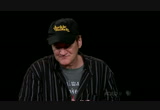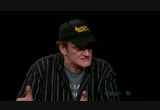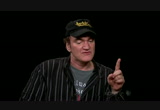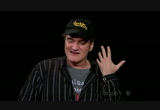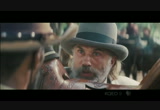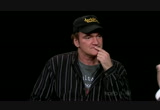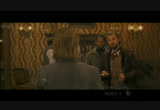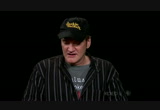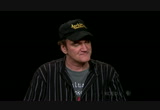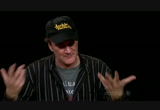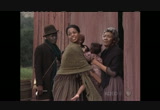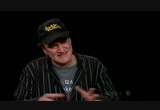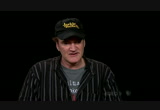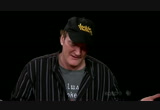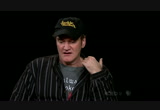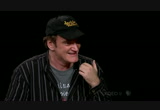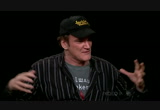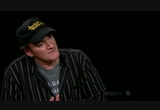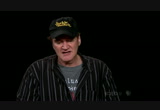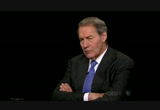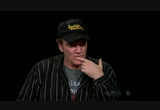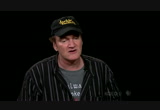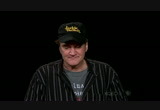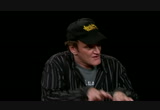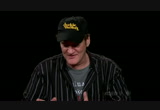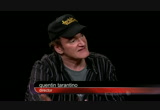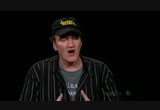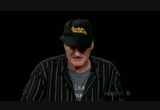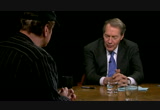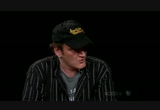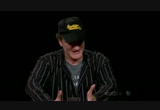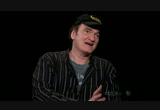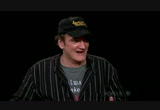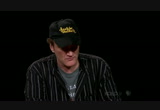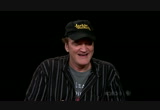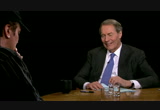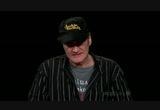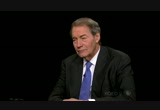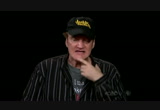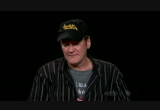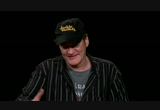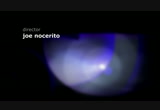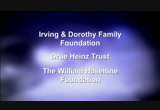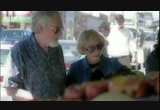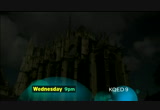tv Charlie Rose PBS December 22, 2012 12:00am-1:00am PST
12:01 am
captioning sponsored by rose communications from our studios in new york city, this is charlie rose. >> rose: quentin tarantino loves all kinds of movie, but the spaghetti western has long been his favorite. he said when he would finally make one it would be in the sergio carbochy universe. now teeno has helmed a spaghetti western set against backdrop of american slavery. it is called "django unchained." here is the trailer.
12:02 am
>> good, cold evening gentlemen. i'm led to believe the specimen i came to acquire. ♪ when i hear the trumpet sound ♪ >> what's your name? >> django. >> and you're exact let's one i'm looking for. >> hey, stop talking to him. >> calm down. i'm simply a customer trying to conduct a transaction. >> last chance fancy pants. >> very well. ♪ ♪ >> you kill people and they give you a reward. >> they are big on the reward. i need your help.
12:03 am
i'm looking for the brittle brothers. i don't know what they look like, but you do, don't you? >> they got my wife and they sold her but i don't know who took her. >> that means we visit every plantation until we find her. >> once the final burden, brother,alize dead in the dust, i agree to give you your freedom, and i'll take you to rescue your wife. >> where are we going? >> yeah! whooo! >> you have my curiosity. but now you have my attention. >> how do you like the bounty hunting business?
12:04 am
>> i like the way you die, boy. >> he is a rambunctious sort, ain't he? >> what's your name? >> django. >> rose: i am pleased to have quentin tarantino back at this table. welcome. >> thank you. it's good to be back at this table. >> rose: where did this movie come from? >> well, i had the idea for it-- not a story, but i kind of had the idea for about eight years or so. and the idea was in its simplest form was a man who was a slave during the antebellum south, before the civil war, who would get free through some circumstance which i hadn't figured out yet. and then he would become a bounty hunter. in particular what he would be doing-- it happened all the time back then-- you know, people would do a stagecoach robbery in
12:05 am
wyoming, get a price on their head, and then they'd go to the south and hide out on plantations as overseers. it it was ripe picking to do a story like that so that was the idea floating around. and i got the-- i came up with the story-- that was just the idea-- i came up with the story towards the end of my press tour for "inglorious bastards." i was working on a book about it. >> rose: a subtextual film book. >> those those are the only kind i write. the thing about it-- most of the western directors are really terrific, whether anthony mann, or whoever. they all-- the good ones all have their own version of the west that they made their characters roam. and carbochy had the most brutal, violent west, and
12:06 am
surreal version of the west imaginable. and i think part of the reason was because he was still dealing with the fascism left over from world war ii, being under mussolini. and his bad guys really kind of ruled the day in his movies. none of his other archtypes can fill the role, except in contrast to the bad guys, and the bad guys represent fascism. the bad guys take over one of his western towns, completely like a nazi occupation. i'm writing that, and want character, the pityless nature of everything. it's a rough no-man's land world. life is cheap and death is expensive. so i'm writin writing this piece, and the thing that is nice is it doesn't matter what the director is thinking. it's about you making your case. it's about me seeing the movies and making my case and either i do or i don't. either i convince you or i
12:07 am
don'tquence you. at some point i'm writing this and i think, well, you know, i'm dying into this and digging it, and i'm think thinking, truthfully i don't know if he was thinking any of these things but i know i'm thinking it, and i can do this. so in almost every way, my film writing led me to my next film, and then using that fascist-led bleak baron, brutal, violent, surreal west as a jumping off point, what is the true american? and that would be being a slave in the antebellum south. >> rose: so you had a movie. >> yeah. >> rose: "django unchained." >> uh-huh. >> rose: the search for the lead, you got jamie foxx. >> uh-huh. >> rose: there's a story you went through about five or six people-- not that you offered them the part, but you-- >> discussed it with them? >> rose: foxx seems perfect for me. >> now i can't imagine -- >> rose: you can imagine will smith but--
12:08 am
>> now i can't imagine anybody but jamie. >> rose: he has that sort of-- >> well, it seems obvious now. to tell you the truth, when he walked through the door it became obvious even though before i met him it wasn't quite obvious. >> rose: what did you see when he walked in the door and made it obvious? >> well, he came over to my house, and we discussed the piece. and there were a lot of little factors. he really understood what i was trying to do. he really appreciated the script. he loved the story, and he liked what it said. he wanted to live in a world where "django unchained already existed. and he's from texas. he's from the south. he's not an l.a. boy or new york boy. un, he's from texas. and -- >> rose: he's talked before how the "n" workforce used against him all the time. >> year, he's experienced race-- we're close enough in the same age he was-- he knows what it's like to be black in the 70s, which still had its rough
12:09 am
places, especially in the south. so one, he got the piece 100%. he really knew what i was trying to do with django. >> rose: and what were you trying to do with django? >> well, just the story itself. you know, i wanted to-- i wanted to go into the bleakest time of america's history, the truly-- the biggest sin that the country committed and the sin that we're still paying for to this day, we haven't gotten past the sin. part of the reason we haven't gotten past it is we have to almost lie about it, lie by omission. and i wanted to throw out there on the table. i wanted to take a modern-day audience and stick them in the antebellum south and see what america america was like at that time in that part country. and deal-- now, i want to do it in an entering way, and me the way to do that is to do it as a
12:10 am
genre pies because it seems like most of the time-- whenever it has been dealt with, at least in the last 30 years or 40 years, it's been either historical with a capital "h" which i think kind of put it at an arm's distance, kinds of puts it a little bit under class, to observe and here are the facts. and we all know the facts, more or less, or there's been movies like, "mandingo" or "good-bye uncle tom" which in many ways i think are much clorls to the truth than the capital "h"movies. so i wanted to do it like a-- an exciting western adventure. and as genre movie first that uses slavery and the antebellum south as a backdrop in order to tell this adventure. and the adventure he was down with and i was down with is of a black male rising up, becoming a
12:11 am
cowboy, becoming a spaghetti western here oh, becoming a folkloric here oh, and goes out and saves his woman. she's in the pit of hell, and he's going to go and extract her. >> rose: the pit of hell is where? mississippi. >> rose: is that where leonardo comes in? >> yeah, he has a plantation. >> rose: plantation. >> it's the fourth biggest cotop plantation in mississippi. but why it's famous is because they have mandingo fights there. and everybody knows about candie because he's the procurer of mandingo fighting slaves. >> rose: how did you get leonardo? you called him up and said, "would you like to play in my movie?" and he said yes. >> leo has always been a fan of my work, my writing, and i think whenever i finish a script, leo gets a copy of it. i don't send it to him.
12:12 am
i think he just procures it. he can do things like that. >> rose: he has somebody who-- >> yeah, year, he knows somebody. and so he had read the script and i got word he would be interested talking to me about playing the character candie. when i wrote the scrirnth i never made is clear calvin candie's age, but it was supposed to be an older guy. i had somebody a little bit in mind when i was writing it, but me being me, i forget the last time i saw them was in 1991, and it actually has been 20 years since then. maybe they've changed. they had a rude awakening. he's kind of a really old man. that's not what i was thinking about. just-- 90s doesn't seem that long to me.
12:13 am
but, anyway, so i go to it talk to leonardo about the whole piece, and he, like me, has been fasinated this part of history, too. and he's the one that actually brings the phrenology aspect into the piece. that's the one thing this thing is missing, and i think it needs to be there because it was the pseudoscience that allowed these southern buj waz feel comfortable about doing the inhuman stuff they were doing. what fascinated me about the ideal of leonardo playing it, once we had our meeting, i walked away and, okay, let me think about the piece now with a younger man. let me go through the paces in my own mind to see if that changes anything for the good or for the bad. and one of the pretexts that i wanted to get at in this movie is how the southern arstockeracy could allow themselves to do this. and actually think it's okay,
12:14 am
talk themselves into it being proper and right. to me this whole thing of, you know, town-- town aristocrates, southern aristocracy, it's just european aristocracy, brought over ad hoc. they kept what they liked. they chucked out what they didn't like and made up a bunch of stuff to go along with it at their own bidding. and so with that in mind, you have to think about it. if you were a plantation owner back then, you know in a real industrial kind of farm, that would be back then in america at that time, calvin candie owning the fourth biggest plantation in mississippi, that's like owning dole pineapple. >> rose: that's a good business. >> so if he owns a property, a parcel of land that's 40 miles long or 65 miles long. so he has all these slaves that work and live on the
12:15 am
plantation. now, them he absolutely owns. they're his property. he can do with them as he sees fit. not only does he have all of them. he also has all the ton of white workers that work there and work as overseers or doing the other things. they're paid, and they can leave, but, you know, the slave they're slave wages, too, almost. but they have their children and their wives and stuff. so you have literally a community living on this plantation, in this ground. for all intents and purposes, those plantation owners were kings as far as that land was concerned. all right, not barons. not burger mighters, kings, and kings with the powers of life and death. the leo part about it, him being younger, i thought of calvin candie as an evil king an evil ruler. then i thought about him playing
12:16 am
the role, and i that you want rather than the evil king, he-- like his father's father and his father, they were the cotton men. but he's not a cotton man. he's bored with it. he's grown up around it his whole life and the farm takes care of itself and he indulges in hedonistic vices, and hedonistic hobbie hobbies to keep himself interested. >> rose: and he said yes. how about christoph waltz -- >> rose: you wrote him in because you loved him from "inglorious bastards." >> he's an amazing human being, and i can't imagine to not do my next movie with him. i have to say it was not a super conscious decision to write him in. the opening scene in the movie came up. i wasn't quite prepared to do it and it came up and i just wrote it, and the next thing know i
12:17 am
had this german walking around. and i thought i guess that's christof. >> rose: this is a seen where dr. king schultz, christoph waltz, tells django he thinks he's found his wife and he should play it cool. >> do you mind telling me what the hell you are doing? >> he didn't call her by name but she's a young lady with marks on her back and speaks german. it's not wise to assume in this instance, i think it's pretty safe, point being, don't get so carried away with your reputation. you lose sight of why we're here. >> you think i lost sight today? >> yes, i do. soon taginizing candie. you're going to blow this whole charade or more than likely get us both killed, and i for one don't intend to die in this country in mississippi, u.s.a. >> i'm not antagonizing.
12:18 am
i'm intriguing him. >him. do you remember that? >> of coursey remember. >> what you said was this is my world. and in my world you've got to get dirty. so that's what i'm doing, getting dirty. >> rose: he's great in it. he's just wonderful. >> truly magnificent. >> rose: the voi the accent, the speech, the tone. >> in particular, him and sam jack son, it's as it they-- and these this one, too-- it's like-- it's like they sing my dialogue. they don't say it. they sing it. >> rose: take a look at this. this is another scene in which the plantation owner calvin candie played by leodardo dicaprio. here it is, roll tape. >> what's your name, boy? >> his name is django freeman.
12:19 am
>. >> where did you dig him up? >> what turn of events brought django and myself together? >> i heard you've been telling everybody them mandingos ain't no damn good, i'm curious, what makes you such a mandingo expert? >> i'm curious what makes you so curious. >> what did you say, boy? >> calm down, butch. no option given. none taken. >> mr. candie, i would appreciate if you could direct your line of inquiry toward me. one, you do not have anything to drink. can i get you a tasty refreshment? >> yes, i'll have a beer. >> rosco, a beer for the man with the beard and i will have a polynesian pearl diver, do not spate rum. >> rose: you wrote every line of this dialogue. >> yes.
12:20 am
he's quite loquacious, isn't he? ( laughter ) when i look at leonardo doing that, it's almost like he's-- and i don't think he's that familiar with it-- it's like he's channeling vincent price or vicko bono, if he lost 250 pounds. >> rose: when you put this affect, you got kerry washington, too. she plays-- >> she plays django's wife, broomhilda. >> rose: and there are some terrible lashing scenes in the movie. >> there's a flashback where django remembers him-- the reason they got-- the reason they're in the predicament at the beginning of the movie is they tried to escape together and they got captured. so they whipped-- whip kerry, and whip broomhilda, and burn runaway "r's" into kerry's cheek and django's cheek and sell them
12:21 am
separately. once django gets free and becomes a bounty hunter now he needs to track her down and save her. in the movie he has a flashback where he remembers her whipping. and it's a-- you know, it's a very disturbing scene. you actually never see the whip actually touch her back, but it's just in kerry's face. un-- whenever you see-- i've never qiept bought it when i see movies where people get whipped because i just know that pain is so unimaginable that people would be losing it a lot more than they ever do in movies. it's almost like brando-esque, and i never bought that. kerry dug deep in herself to actually give a true human representation of what that must be like, and it's kind of shattering. . >> rose: uniform seen "roots." you've seen documentaries about slavery. what is it you think you can tell us that is not told in those renderings of history? >> well, in the case of
12:22 am
documentaries, it's not so much i can tell something that a documentary can't. documentaries can do a really good job. that's a different story. i'm doing a dramatization. in the case of "roots" i'm a perfect age for equip roots." i think i was in seventh grade, going to a mostly black school when it came out and i, like almost everybody else in america, was glued to the tv set for the seven, ability days that aired. however-- i mean, i don't think "roots" actually aged that well, if you look at it 30, 40 years later. partly is some of the casting. some of the casting is really good, but some of the it-- especially the white people is really cheesy tv actors playing roles really beyond them and kind of cheapening the whole process. but the thing that really gets me about "roots--" and a lot of people i've talked to-- it is you watch this whole thing that's on for 16 hours or something, and you're actually
12:23 am
living the lives of these people, and putting yourself in that place. and if you remember, want last episode of it, are as lloyd bridgees, one of the most hate of all the racist guys in the movies, and chicken george, played by ben vereen, one of the guys you've been following the most, and at the end of the movie, they have lloyd bridges and they tie him to a tree and chicken george is going to whip him. he's going to give him a peeling to end all peelings. and you've been waiting 16 hours for this. and, naturally, he does the thing that they normally do in these movies like, "no, no, no, i can't do that. that would make me as bad as you." and when he said that, all over america if, 100 million people said, "no!" "whip his..."
12:24 am
( laughter ) >> rose: he had it coming! >> he had it coming. it's about time for payback. you don't have that problem in my movie. >> rose: you get payback. >> you get payback. >> rose: you also say the movies that you're making, you're not making them for today. you're making them for 30, 40 years from now. >> i think you have to think like that. do i want a lot of people to go see this movie? absolutely. do i want to go into a theater and feel the audience had a good time at the movies-- whatever you constitute that tept-- yet, i do. if i want laughs, i want to hear laughs. if i want them to cheaper tend like i do in this movie, i want them to cheer. and if they're not cheering in the right way how do i need to influence so they are cheering the way i want them to do. that's just now. i mean, this is most-- if you think about something like, say, "the wild bunch," what it made on the friday it opened, does that mean anything now? no it's "the wild bunch."
12:25 am
it's got to last for a long, long time. i'm looking forward to, you know, kids who aren't even born hearing about "django unchained." they're going to grow up nay world with "django unchained" exists. >> about paul make the "wild bunch?" >> yes. >> rose: why would you put him in john ford and people who made movies about the western? >> i would put sergio leon eddie number one. >> rose: you would? >> in particular because of "fist full of dollars." >> rose: he's number one. >> he's number one to me, kind of number one of all time, not just his western work. he's my favorite director. as far as western directors are concerned, after that, i would actually probably-- my next three guys-- i hate to rate them after that, but my next three who are my favorites would be sergio carboshy, sam peckenpa,
12:26 am
and it whitney who did a lot of roy rogers movies and other movies as well. he's my favorite of the old salty dogs. >> rose: really? because? >> >> his. s are fantastic. one of the things about his movies that's actually very interesting is his movies are also quite violent for the day. in fact, in retrospect the people who kind of like those wrnz refer to him as the peckenpaw of the 40sand 50s. he was never quite as violent but it was rough stuff. >> rose: what don't you like about john ford and george stevens and those-- >> george steve tens only did one western. >> rose: what "giants?" >> a more than day western purpose western-esque. it's a soap opera. "dynasty." but i can't stand john ford gli know you can't and i'm trying to find out why. >> one, i think he was a racist ( bleep ).
12:27 am
he wor a klan uniform ride of in "birth of a nation." he's one of the klan riders. let's look at john ford and billiam wendy. ford started his career wearing a klan robe. whitney directed the dramatics singing, "what you see is what you get." i know what side i'm on. ( laughter ) >> rose: so the movie here, tell me what it's about in a sense. not what happened in the movie. but in the end it's about? >> in the end -- >> rose: what is it its enduring quality? >> at the end of the day, i think... it true empowerment for the black male. watching the film. and true empowerment for the black male at that period of time.
12:28 am
i remember, it was funny. you know, there is-- there has only been one movie that kind of dealt with the subject that i'm dealing with a little bit that touched on it. and that was it a movie called "the legend of niger charlie." it's not that great a movie but it's not that bad, either. it's held down by the fact they had a nonexistent budget. they had no money to do it, even though paramount made. of all the movies that trip all over themselves with historic facts and try to tell a story, sometimes the movies with a capital "h" history, they're made with the best of intentions but at the end of the day they're a downer. it's more of a spartacus story, the slave who fights back and gets his. in this, i wanted to take-- you know, i parallel django's your honor i with the siegfried broomhilda myth from wagner's
12:29 am
"the ring," and even longer than that. it's when-- all the german legend. my bar lel that django is a siegfried-like figure and the it woman he's look for is truly named broomhilda. and i wanted to give this kind of story of a black man in that time period where he's considered three-fifths of a human to be able to go all wait to the pit of hell to extract his woman, his-- his princess in exile. who is basically locked in the tower of the evil kingdom by the evil ruler and get her out. and play it in that-- and give it the spaghetti western operatic view of the whole thing, the bigness of opera. the hugeness of a folkloric legend. and the of mix that, also, with negro folk lore from the time,.
12:30 am
powerless animal able to triumph it over with cunning guile. >> rose: what connects your movies? is there some common demom they were the in all them? >> i don't know if i'm the best person to say that. it's more of an analysis thing for somebody else. i'm not ready quite actually to look at that. one commonality that happens-- i'm not trying to do it, it just end up becoming the character' character's mode operandi, i think it's safe to say all my kierkz apt least somebody in the movie-- are really good actors. they're always playing a role. they're always doing some sort of weird undercover-up thing pretending to be somebody they're not. they're putting on an act of some sort to get what they need done. they're pretending to be somebody else. and they pull it off with complete aplumb.
12:31 am
they're good at it. >> rose: clint eastwood is a hero of yours but not because of his acting, per se, but because he's a filmmaker. because he gets the business side. > side. >> if you're talking about him in the dollar movies that's about as good as it gets, as far as a cool, iconic here. having said that, though, what you're referring to is early on, i realized i really admired-- even before i made moviees, clint eastwood's relationship with warner brothers, want fact that he didn't go around and do movies with the other studios. he kind of set up shop at warner brothers. if he wanted to do something chancy, he'd do of do it for a lower budget, and they let him do it.
12:32 am
he could do what he wanted to do. if he wanted to do one of the "dirty harry" sequels . >> rose: one for you, one for me. >> exactly. the whole idea of creating a family at one studio that you can grow and as long as things don't cost too much you could be able to expand, that really hit me. that's the way to keep your integrity over a long haul. and i'm-- i'm lucky now have that situation with harvey weinstein. >> rose: you've in a lot of people-- and you have been influenced by a lot of what you have seen, a lot of what you've read and studied and all of that. termy guillen gave you some advice before you made "reservoir dogs." do you remember what it was? >> i sure do. "you see movies and they can be full of vision and you want your movies to be like that. but you see these other movies that don't have any vision but i'm sure the director tried. what's the difference between
12:33 am
this guy versus that guy? how was this guy able to get this on the screen and how was this guy not able to get on the screen? i'm sure if i talked to guy, i'm sure he wanted that. who knows? and i was afraid of being that guy. i want to be that guy. terry gilliam definitely had the vision. we were at sundance and it was, like a lunch going on at the picnic tables, and it was just me and him talking, which was a thrill. and look, you have a very specific vision in your movies, and it's right there on the screen. how do you do that? how do you get that vision that's in your head, how do you get it on the screen? and he said, well, quentin, you have no understand, as a director you don't have to do that. your job is to hire talented people who can do that.
12:34 am
you hire a cinematographer who can get the kind of quality that you want. you don't have to be able to know how to take the light and move them to create an effect. you hire a talented costume designer who can give the colors that you need and flamboyance-- or not. you hire a production designer who can do that. your job is explaining your vision. your job is articulating to them what you want on the screen. and then all of a sudden, the whole mystical shaman historic thing i thought direct was was, when boom. and i realized i could do that. there wasn't a merlin-like magic kit they needed to know the right spell in order to conjure. i can describe what i want! ip know what's in my head! that's the easiest part. i'm good at describing. >> rose: is there a series of movies you want to make? i've tried to look at what
12:35 am
you've done and asking where is he going? >> i'm getting excite bide the sentence, that little wrap-up you did there. the question is, what is he going to do next? i think in particular in the case of finish "inglorious bastards," and the case of finishing this, who knows what i'm going to do next. there is that was that, and this is this. and it does seem like, okay, there's a box checked-- not going down a box, but, okay, that's hills western statements. that's his statement on slavery. what's going to be his next union raw, the next statement. >> rose: but you have no idea what it is? >> right now i'm not sure. >> rose: and how will you find it? >> i have to say i usually find it through other writing. . >> rose: hoping it will lead you to thinking i want to go here. >> i really like doing
12:36 am
filmwriting. and i haven't punished -- >> rose: film writing? these are esize filmes, not criticism? >> it's kind of criticism/eseye, usually about the director so i don't get in trouble and be sheepish with someone at the parent because i wrote bad stuff about them but it's unfair to take a swipe at a colleague. i'm a critic, i'm a critic. if i'm not, i'm not. but i love that type of writing because i love being the student of cinema all the time and dealing with it and constantly putting my aesthetices, what i consider good work, very bad work, constandpointly under a microscope and being forced to describe it. in this case in particular, it was that writing that led me to the story. and one of the things that was great about it, because i had been doing so much writing i wasn't cold when it came time to write in piece. i was lube riidate. i was in the zone.
12:37 am
i was writing every day. and that was really exciting. >> rose: i remember one night on a plane eye have told this story before. do you remember this? >> yeah. >> rose: i get on a plane and i'm exhausted. i've been, into filming all day in los angeles. he's on the plane, the overnight red eye. and i get on the plane as i always do and probably have a glass of wine you and the my head back and go to sleep. i look over at you and you're typing away. i wake up before we're going to land, and you're still doing that. i said he's been up all night creating. >> to me, the greatest thing about an airplane is i love all that time by yourself. >> rose: i do, too, actually. >> i love being in there and no one is really talking to you. i always have books to read and always have stuff to write. >> rose: does this creative power you have, creative energy, have an outlet anywhere other
12:38 am
than film? you will argue criticism and i'll take that, but what else? i mean, do you create music? >> no. >> rose: you don't create that, no. >> i appreciate it. >> rose: yeah. and you make movie movie about it. and i use it in my movies and it's a huge -- >> rose: it is. it's a defining part of your-- >> i agree. but i don't make it. >> rose: so what does that make you a kind of agigator? requesthere is modern art going on, there is-- for lack of a better word-- hip-hop aesthetic, taking what you like that already existed expz putting it in your own work and the way you do it, the way you create it, something that didn't exist before. it took a while to be respected but that's where i've been coming from. >> rose: how do you use it? how does it add to the film?
12:39 am
personally i think -- >> rose: it creates mood? it creates-- >> well, i think it's one of the most-- i try not to use music just as a case of pacing. that's how everybody else does it. they put innocuous music for the ticking clock. but i think the reason that my music works so good is i don't just blanket it in there. when it is in there, it's there for a real purpose. but i actually think the right use of movie image and the right-- connected with the right music is usually most cinematic moments in the history of cinema, especially when we've gotten to the point where we can actually cut to music. those are the cinematic moments. those are the moments that i'm waiting for as the clock's ticking down, as i'm watching the movie -- >> rose: is it a joy for you putting the movie together inap editing room? is that what you like most rather than filming the scenes and making-- putting it in--
12:40 am
>> no, it's all great. look,. admittedly, editing is far less historical. you get up and go to work -- >> rose: it's probably more creative, isn't it? >> it's not more creative than shooting. >> rose: shooting is creative. >> shooting is crazy creative. especially the way i do it. >> rose: how is that? >> it seems like eye hate to be the oldest guy on the block kind of talk, but i feel as time has gone on, i feel like the oldest guy on the block because it just seems like every time i do a movie, two years later or something, the industry has moved even further away from how i do it, and everyone does it completely different or the rules on sets and everything are just very, very different from the way i remember them. and it just keeps going like that all the time, further and further away. but one of the things i do, just amongst a zillion of them, but one of the things that's a big deal for me, one, i don't use a
12:41 am
monitor when i'm making a movie. it seems like some -- >> rose: there's no monitor there? >> no monitor. there might be little hand monitors so i can keep track of something -- >> rose: are you serious? >> the whole deal, though sthat's not how do you it. what you do is you is-- i didn't conjure all this up so i book in another room watching television as my actors are out there doing their scene. all right. i take the camera. i frame the damn shot, and i sit right next to the camera. either i'm operate the camera-- which i didn't do much on this movie. >> rose: i thought you made the point what you discovered about being a great filmmaker is you can hire people to do all those-- you can hire a great cinematographer >> and do have a great
12:42 am
cinematographer. sometimes i like the fun of operating the camera. sometimes it's kind of fun. >> i like, it's like the camera's here, the camera's here, the actors are right here. and i'm right here. i'm right next to the camera. and i'm watching-- i'm watching the scene. i can actually talk to the actors during the scene. i come up with a line, throat line at them, "say that." or maybe i'm their inner voice. maybe i'm their conscious. somebody says something and i say what does that mean? what the hell does that mean? or, he's lying. don't let him get away with that. i'm not saying i do that all the time but if i feel like tit comes out. if what else is important to me-- and this has changed as time has gone on-- it's standard now on most movies and all television shows to at the very least have two cameras operating
12:43 am
at all times if not three, if not four, if not five, if not six, if not more. butt very least two. and in that scenario, it's, like, okay, you have your main shot that you want. and then there's this other camera, and then you're sticking it somewhere where it's not seeing this one, and it's not seeing the other equipment. but it's just-- it's a sloppy-- it's a sloppy angle but it's just there to give you a little more footage in the editing room so you can get through your day a little bit easier. obviously-- but now you have to split the lighting. i don't want that. i want to-- i'm frame-- i have one camera on the set. and the only shot we're shooting is the shot i'm framing. i frame the shot. and bob richardson lights the shot for that frame. and that's it. and i don't want sloppy-ass crap, you know, in there that i can just cut to. if any composition you see in my
12:44 am
movie was composed by me, and that's what he meant to do. >> rose: i've seen a movie of yours can was composed by you. "comb pose it" means? >> means to set the frame. >> rose: just to set frame. that means to compose it. how close it is, where-- >> exactly. balance the frame, make it right. >> rose: some might suggest-- and this is the a question-- if you could have been leodardo dicaprio and have his acting career, would you prefer that than the director of directing crier of quentin tarantino? >> me way. >> rose: you know that people don't believe you. they believe you really want to be an actor. >> dia long time ago. trust me, it i've lost that bug so much i can't even tell you. i can't even tell you how much i lost that bug. i had the bug. i got bit. it's gone. it's gone. >> rose: you got bit after you
12:45 am
made your first film? >> no, i always wanted to be an actor early or and everything, but i got kind of although during the time i went out with myrrh, it actually kind of fanned that flame a little bit. she was a terrific actress, comes from an acting family, i had aspirations in that regard. it fanned the flame a little bit and i got a little carried away with it. after i did "kill bill" all that went away because if i'm-- it i've been offered a lot of things in the last 10 years, and i always turned them down. >> rose: you do two cameos in this film. >> i do one because it was just easy to do. the other one i did basic plea because we kept moving want scene further, further back, and we kept losing actors because we had scenes we were going to go around to. if i put my stuff in there and have to cut it down to nothing, i have no problem with that.
12:46 am
i can cut me, no mores. but the thing about it is movies are hard. if i'm going to be on a set, i want it to be my set. i don't want to be making somebody's dumb movie as an actor. i don't want to in the makeup sharing i don't want people faxing schedules to me. i don't care about your movie. i care about my movie. >> rose: i'm surprised you have never worked with johnny depp. >> we would love to work together. we talked about it for years, not that we get together and talk about it for years. we're obviously fans of each other. >> rose: i would imagine that knowing both of you. >> it just needs to be the right character. i need to write the right character that i think johnny would be the guy to do it with. and if he agrees, then we'll do it. then it will be magical. >> rose: it takes time to find i haven't--
12:47 am
>> i haven't written the perfect character for johnny death penalty, as of yet. >> rose: if you look at this character that jamie foxx plays, it wasn't written for him. >> no, no, no. that's not the point. >> rose: but it fits him. >> i didn't say i have to write it for him or johnny depp or jamie foxx, but it really is a thing to me now that, you know, aside from somebody like it christof if or-- i'm contradicting myself. for the most part if i don't have joe maim namath and jim brown in my back pocket . >> rose: that's an interesting reference. >> if i don't have that, i want to write the character and i don't want to think about anything if of an actor's pluses or limitations as far as that character is concerned.
12:48 am
it's what i'm here to do. i'm here to create these characters that come out of this deep d.n.a. of my tissue. and i only get one crack at it. i'm not writing theater that people will be doing every 20 years. maybe some day it will but not right now. so i write that character, and then nothing is more important, just finding the perfect actor. but when that character is perfect, like in the case of leonardo here or maybe johnny depp some day or somebody else, there's a reason there's an excitement when they come together because it is magical. >> rose: who else might be on the short list? >> people i would like to work with? >> rose: yeah. >> uh, i'd love to work with michael cain. i've always been a huge michael cain fan. i think he's actually terrific. and i would really like to work with meryl streep. i'm a huge fan-- i think we would get along like a house on fire. even though i don't know her. >> rose: you would get along, i assume. let me close with this--
12:49 am
somebody with talent and promise and the gusto and passion that he just talked about, which is you, comes to you and let's say they've made some small film that you think shows talent. and they say to you, mr. tarantino, tell me what you have learned they need to know about being a movie maker." under. >> hmmm... you know, i... i don't think i have any big, old, stage, blankety umbrella perlz of wisdom as far as that is concerned. it would have to be much closer to-- something much more specific. if i actually was going to try to see their strengths or something, maybe i would ask them how they work with actors, if i liked the movie. "how did that work out and how
12:50 am
did you do it?" and they would tell me their way. and fithought there was a deeper level that they could get, then i might take them in that way. >> rose: can you imagine making a movie from a script by someone else? >> i can imagine it. >> rose: is it likely? >> not really. not really. no. i don't really think it is. never say never. and who knows? maybe it might be one of those things like six years from now that you might actually be the creative thing to do, to break yourself out of youron. >> . >> rose: or somebody may have done something that's so good it's irgist pirsiftable. >> that's true. but if it's that good be somebody else it it could do it, too. i feel i was put here to take those blank page pages and fill them up. >> rose: exactly. this is my last question period
12:51 am
of time of the total film that comes out of "django" like "pulp fiction" like "inglorious bastards." how much does on some scale about the screen writing am. weigh? is it 30 pounds? is it 50 pounds? is it a stupid question? >> no, it's not a stupid question, actually. it's interesting. president me give kind of a two-- let me answer it directly. before i answer it directly, let me say that when i do something like this or something like "inglorious bastards" or whatever, "pulp fiction" and i'm sitting in a movie theater and we're watching it-- and hopefully the audience is liking it, and they're laughing or doing this and doing that. it's very, very exciting.
12:52 am
but the thing that gives me the most pride, the absolute most bride is to know that not very long ago-- it's not like i write something and it takes me five years to get it made-- not very long ago there was a time where it was just me and a pen and a piece of paper. it started out with a pen and a piece of paper. and even-- you misrepresented me a little bit when you told your plane story because i was not typing. it was writing. but the thing about it is the fact that this starts out as a blank pieces of paper and filled up 170 pages, and now it's this finished movie that's playing in theateres and everyone is responding to it. that origin of it is really, really important to me. it's a big point of pride. i would actually say it's 60% of it, if not maybe even a little
12:53 am
more. because if i do it on the page, it i can do it on the set. and i can do it in the editing room. it's all about the beige. all about the page. if i do it there, that's the big battle. everything else will fall into place if i can do it here. >> rose: what's the best line you've after written or dialogue? >> i think the one that has lived the longest is i'll get medieval, "from pulp fiction." i don't. i don't. >> rose: but you like that one. >> i do like that one. that will be something that whatever i've written last will probably be one of my favorites. my favorite lean in "django unchained" is when christoph waltz is looking to these slaves, he's going to free them,
12:54 am
and he-- so he frees them, tells them their options and he goes, "by the way, in case there are any astronomy afish that you had bowes you, the north star is that one." once i wrote that i knew i had to finish the movie because that's too good a line. >> rose: thank you. quentin tarantino, "django unchained," opens on tuesday, december 25. >> ho-ho-ho. >> rose: ho-ho-ho. thank you for joining us. see you next time.z4t
12:59 am
captioning sponsored b bed by t >> this is n.b.r. >> susie: good evening, everyone. i'm susie gharib. tom is off tonight. president obama tells republicans and democrats they have ten days to work out a fiscal cliff deal. and he says it's doable. tonight's market monitor guest is not scared off by cliff worries. he's buying stocks, saying the markets will do well in the new year. he's richard steinberg of steinberg global asset management. and warren buffett, the oracle of omaha has plenty to say on taxes and the fiscal cliff: we talk with his long-time friend and "fortune" magazine journalist carol loomis. that and more tonight on "n.b.r." some straight talk from president obama tonight about
206 Views
IN COLLECTIONS
KQED (PBS) Television Archive
Television Archive  Television Archive News Search Service
Television Archive News Search Service  The Chin Grimes TV News Archive
The Chin Grimes TV News Archive 
Uploaded by TV Archive on

 Live Music Archive
Live Music Archive Librivox Free Audio
Librivox Free Audio Metropolitan Museum
Metropolitan Museum Cleveland Museum of Art
Cleveland Museum of Art Internet Arcade
Internet Arcade Console Living Room
Console Living Room Books to Borrow
Books to Borrow Open Library
Open Library TV News
TV News Understanding 9/11
Understanding 9/11
